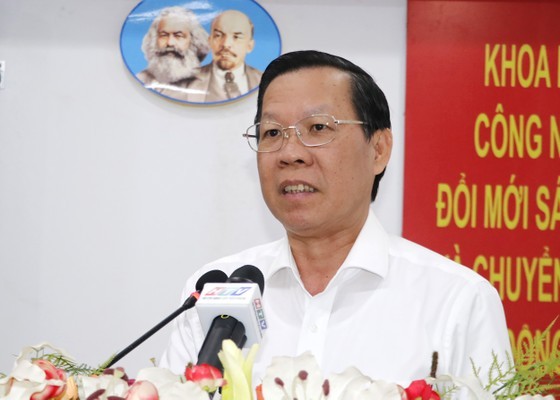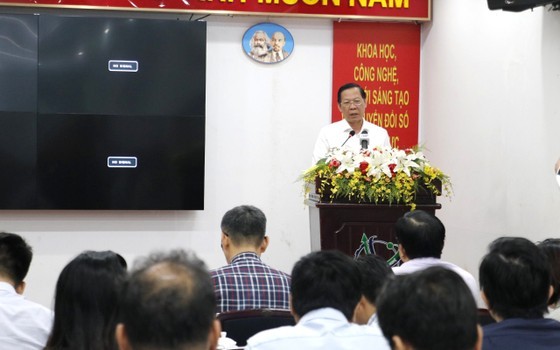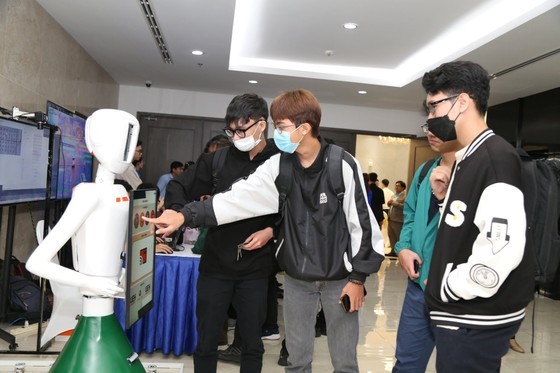 |
Chairman Phan Van Mai is delivering his speech in the meeting (Photo: SGGP) |
In his speech, Chairman Phan Van Mai asked that the Party’s Committee of HCMC Science and Technology Department review all of its yearly and term targets and missions to devise corresponding measures to achieve them so that the role of science-technology can be best played in the city’s growth.
He further requested that the HCMC Department of Science and Technology continue to study and propose suitable solutions for issues in the fields of law and policy, infrastructure investment, human resources development so as to increase the use of science-technology in socio-economic activities and public services in HCMC.
As to the project to support HCMC’s innovative startup ecosystem in the 2021-2025 period (Project 672), the Chairman demanded to identify specific fields of in-depth development since HCMC is the place where all resources converge.
 |
Chairman Phan Van Mai asks that HCMC Science and Technology Department effectively implement Resolution 98 to develop science-technology in the city |
Regarding the mission to establish HCMC Innovative Startup Center, Chairman Mai asked that this center must reach the regional level and then the national and international ones. However, the current institution and regulations do not allow that to happen, hence a need for better mechanisms taking advantage of Resolution No.98 by the National Assembly. This is expected to turn HCMC into a ‘Sandbox’ in innovative startup, along with tight connections to form a close network for development.
To turn HCMC into a science-technology hub of the region and later to reach the international scale, the city’s capability in the aspects of accepting new trends, thinking, planning of its leaders and professional units must be improved. Following that is an effective application of mechanisms offered by Resolution 98 to attract all possible resources here.
Finally, the city’s Chairman commented that the maintenance of order in daily operations of the Party’s Committee of HCMC Science and Technology Department must go along with an increase in quality, a boost of innovation, a better implementation of science and technology in reality to fulfill focused missions and contribute to the city’s growth.
 |
After half of its term, HCMC Science and Technology Department has launched several activities to support the city’s innovative startup ecosystem |
Passing half of its term, HCMC Science and Technology Department has performed a decisive role in various scientific-technological activities of the city, closely worked with state agencies and science-technology businesses, organizations, educational institutes sited here, promoted administrative reform and technological infrastructure development.
In the 2021-2023 period, the Department has advised HCMC People’s Committee in issuing several mechanisms and policies to support innovative startup and digital transformation. It has also boosted the growth of HCMC innovative startup ecosystem via meaningful activities of improving the innovative capability, supporting the incubation of startup projects, helping entrepreneurs to access venture capital sources.
As a result, a favorable environment has been created to promote the establishment and growth of a new business model that can develop fast based on the exploitation of intellectual properties and technologies. This, in turn, encourages social investments in scientific-technological activities. Therefore, 75 percent of the assigned targets in Project 672 have been completed.
The current challenges of HCMC Science and Technology Department are that devised solutions cannot keep up with the demands for socio-economic growth and urban management of the city. Social investments in science-technology do not correspond with the expectation to develop product manufacturing and service provision activities.
In addition, necessary facilities to serve scientific research and innovative startup, especially in the hi-tech field, cannot satisfy the needs. The relationships between universities and businesses for scientific-technological activities have been improved yet not truly close nor sustainable.
In the second half of its term, HCMC Science and Technology Department aims at increasing the contribution of total factor productivity (TFP) to GRDP to over 45 percent and the spending on science-technology to 1 percent of GRDP. The proportion of applying scientific-technological missions’ results after evaluation must reach over 70 percent and direct applications for businesses come to 60 percent. The percentage of innovative startups must comprise 50 percent of the national total.
























